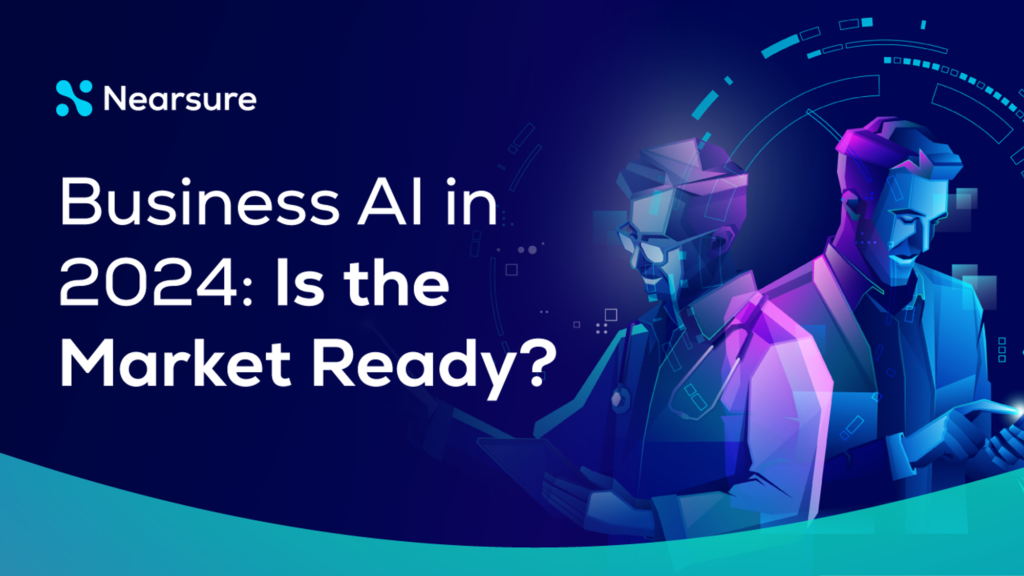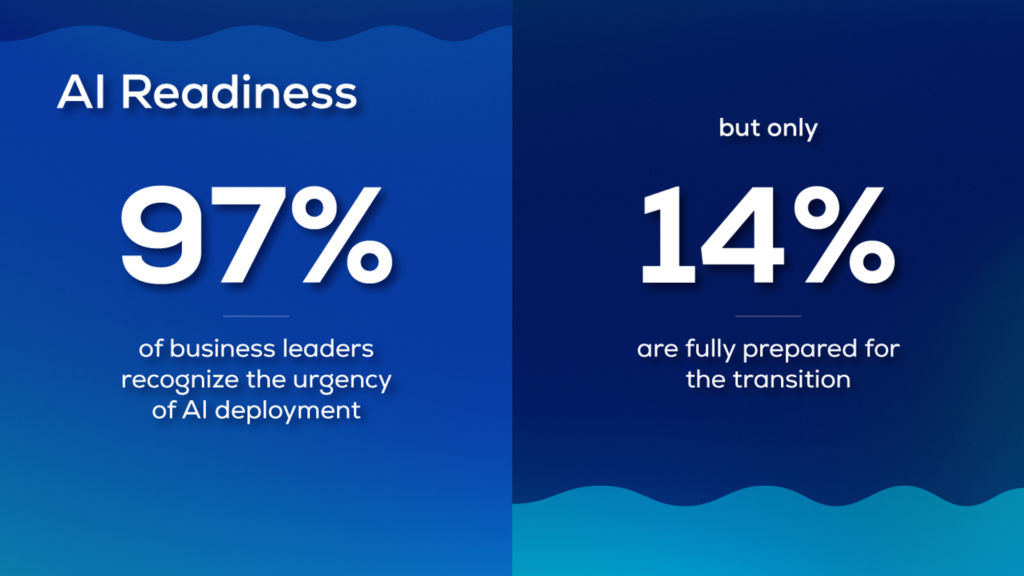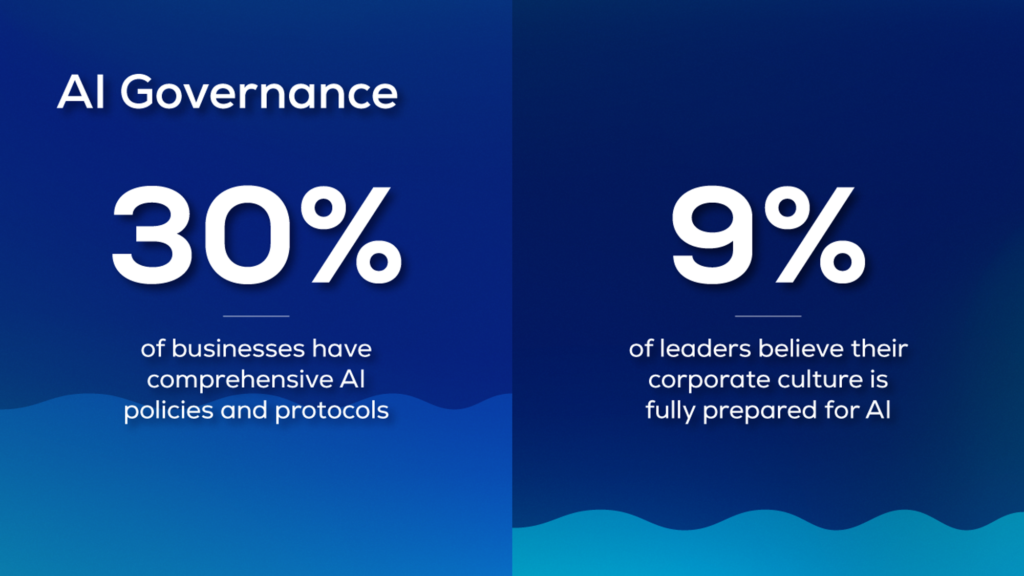
Business AI in 2024: Is the Market Ready?

TL; DR: Dive into the impact and challenges of AI in the corporate world in 2024. Covering strategy development, consumer attitudes, and implementation hurdles, this article also examines AI’s measurable business benefits, as seen in companies like Amazon and Google. Essential reading for understanding AI’s growing role in business today.
In 2023, the corporate world witnessed a significant pivot towards AI, as evidenced by a McKinsey report showing that a third of companies are integrating generative AI into their business operations.
However, the widespread adoption of AI across industries remains gradual, with only 55% of organizations having embraced it, often limited in scope to specific business functions like product development and service operations.
On the consumer’s side, it’s a different story. While many individuals have had some interaction with generative AI, either professionally or personally, there’s a noticeable gap in embracing these technologies in everyday life.
This article will delve into the intriguing dynamics of AI’s growing influence in the corporate realm and its cautious reception among the public. Let’s explore how businesses and consumers are navigating this evolving landscape, balancing innovation with ethical considerations.
Understanding Consumer Attitudes Towards AI
Consumer hesitation towards AI is rooted in diverse concerns. Privacy issues lead to these worries, along with fears about AI infringing on personal data. There’s also a prevalent misunderstanding of AI, resulting in doubt about its real benefits. However, on the flip side, applications like ChatGPT show AI’s positive potential, especially in the social media and advertising industries.
For businesses, this gap poses a challenge. Despite heavy investment in AI, a lack of consumer receptivity limits its impact. The goal is to balance technological innovation with human acceptance, positioning businesses as facilitators in this synergy.
Implementing Strategies for Business AI Success in 2024
Crafting a coherent AI strategy is crucial for businesses stepping into artificial intelligence or continuing its implementation from 2023 on. Insights from Fast Company highlight an interesting paradox: while nowadays almost every company has an AI strategy, a vast majority are not ready for implementation. Cisco’s AI Readiness Index, encompassing responses from over 8,000 business leaders, reveals that while 97% recognize the urgency of AI deployment, only 14% are fully prepared for the transition.

Businesses are aware of AI’s potential, prompting the creation of detailed strategies for its integration and use. However, the challenge lies in moving from theory to practice. Many companies face a bottleneck, struggling to translate their theoretical AI potential into practical, impactful applications.
Governance is another major challenge. Only 30% have comprehensive AI policies and protocols. Alarmingly, a quarter lack systems to detect or address data biases, despite 95% having a defined AI strategy.

The interpersonal aspect is also critical. Just 9% of business leaders believe their corporate culture is fully prepared for AI, with a discrepancy in AI receptiveness between leadership (82% receptive) and employees (68% receptive).
For businesses to succeed in AI implementation, they must overcome these hurdles. It’s about readiness in data handling, governance, and fostering an AI-receptive culture.
Tackling AI Implementation Challenges Head-On
As businesses venture into the AI-driven future, they encounter a series of implementation challenges. Let’s explore how these obstacles are being addressed.
Challenge: The Technical Expertise Hurdle
Finding and retaining AI talent is a critical challenge, with many organizations struggling in this area. To counter this, companies are increasingly focusing on talent development initiatives. This approach not only mitigates the expertise shortage but also enhances internal innovation capabilities.
Challenge: Data Privacy Concerns
With consumers expressing privacy concerns regarding AI, businesses face the challenge of ensuring ethical and secure data usage. To address this, leading companies are establishing robust data governance frameworks, prioritizing privacy and ethical data use.
Challenge: Integration with Existing Systems
The clash between legacy systems and AI technologies is also a significant barrier. A solution that is gaining traction is the adoption of incremental integration strategies. By gradually assimilating AI, companies have seen improvements in operational efficiency, minimizing disruption while maximizing the benefits of AI technologies.
Golden Tip: Leveraging External Expertise
Facing complex implementation challenges, many companies are turning to collaborative partnerships with AI-specialized firms. By drawing on external expertise, businesses can navigate implementation hurdles more effectively and accelerate their AI adoption timeline.
In 2024, the path to AI implementation will become clearer as businesses adopt these strategic solutions. By addressing each challenge with targeted strategies, companies are better positioned to harness the transformative power of AI, tailoring solutions to fit their unique business contexts and needs.
Measuring the True Impact of AI in Business
The success of AI initiatives cannot be confined to technical achievements alone. It’s important to set tangible and varied metrics to assess AI’s impact. There are some key areas when it comes to measuring AI success:
- Focusing on Customer-Centric Metrics: Metrics like Net Promoter Score (NPS), customer retention rates, or qualitative feedback gathered through surveys and sentiment analysis tools are vital for gauging AI’s effect on customer satisfaction.
- Evaluating ROI and Business Impact: The financial impact of AI initiatives must be quantified. This includes monitoring cost savings, revenue growth, or efficiency improvements attributed to AI. Google’s 23% increase in customer-perceived value is an excellent example of AI’s direct effect on customer experiences and business growth.
- Assessing Long-term Value Creation: Evaluating AI success shouldn’t be limited to immediate benefits. It’s also critical to consider its potential for fostering long-term customer loyalty, enhancing market competitiveness, and adapting to future changes.
Seizing AI Opportunities and Meeting Consumer Expectations in 2024
As we stand at the threshold of 2024, the message is clear: the future of business is intertwined with AI. This year, let’s use AI to connect, understand, and serve better. Let’s leverage AI to not only advance our businesses but also to enrich the lives of those we serve.
Are you ready to take this leap? Start your journey towards AI integration today.
Contact us for insights and guidance on becoming AI-ready in 2024.
Together, we can make the next leap forward.




